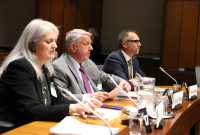Support strong Canadian climate journalism for 2025
The Canada Revenue Agency must do more to build trust and prevent discrimination when interacting with Indigenous clients, according to a report that became publicly available last week.
The report, prepared by Earnscliffe Strategy Group, sought to gather data on Indigenous Peoples’ experience when engaging with CRA tax services and accessing benefits and credits. Its findings come from an online survey of 1,742 respondents, as well as online focus groups and in-depth interviews.
Participants were asked about their experiences filing taxes, interacting with the CRA, accessing benefits and credits and their overall impression of and trust in the federal agency.
While two-thirds of participants had a neutral impression of the CRA overall, nearly a quarter strongly disagreed that the CRA works for the benefit of Indigenous Peoples. Many have felt discriminated against due to misinformation about tax exemptions for Indigenous Peoples, both by Canadians and representatives of the CRA, the report found.
Tax exemptions are a longstanding source of anti-Indigenous racism in Canada. In a 2022 report titled, “They Sigh or Give You the Look: Discrimination and Status Card Usage,” the authors found a mention of status cards can trigger racist comments rooted in stereotypes that First Nations people get “handouts” or “stuff for free.”
Tax filing fluency is important for Indigenous Peoples in order for them to access benefits, credits and exemptions. Benefits for disabilities or single mothers are disrupted if a client files late. In the CRA report, just two-thirds of participants had filed income taxes in the past year.
Limited trust in the federal agency has also led to many Indigenous Peoples having “a reluctance to interact, or being stressed when dealing with CRA and putting it off as a result,” the CRA report found. In the survey, 17 per cent of people strongly agreed people at the CRA are trustworthy, while 16 per cent strongly disagreed.
The report also found most Indigenous Peoples are not accessing their tax exemptions within the Indian Act. Just over a quarter filed the exemption, whereas two in five respondents who did not use the T90 form to file for an exemption were unaware it existed.
The report suggested the CRA should make the tax filing process simpler by using less technical language, hiring more Indigenous Peoples, including agents who travel into communities, and having a dedicated phone line for Indigenous Peoples staffed by Indigenous Peoples.
Canada’s National Observer contacted the CRA to ask how many Indigenous Peoples are currently on staff, whether they travel into communities and if a phone line is in development but did not hear back by time of publication.
An access-to-information request filed by Canada's National Observer revealed the CRA reached out to national Indigenous organizations last year to improve Indigenous Peoples’ tax filing experience and access to benefits.
The Assembly of First Nations and Inuit Tapiritt Kanatami didn’t respond to a Canada’s National Observer request for comment regarding how the CRA’s research was presented to them.
The new report updated existing public opinion research completed by the CRA in 2017. Those studies found the CRA needed to provide greater outreach to urban Indigenous Peoples to increase awareness and understanding of benefits associated with filing tax returns, according to a summary of the 2017 report.
Various government benefits, such as disability benefits and those for single mothers, are dependent on filing tax returns on time. However, some people who failed to file on time didn’t realize it would disrupt their benefits, the 2017 report summary says.
Matteo Cimellaro / Canada’s National Observer / Local Journalism Initiative







Comments